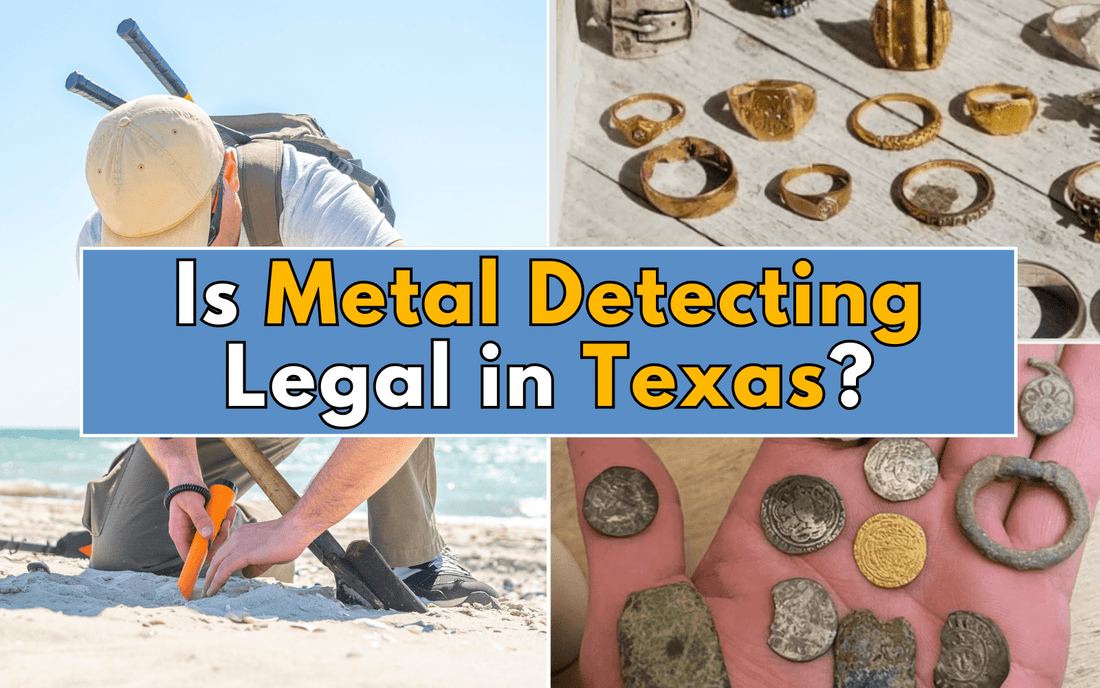
Is Metal Detecting Legal in Texas? Understanding the Laws and Regulations
Share
Metal detecting is a popular hobby that combines the thrill of discovery with outdoor exploration. However, before you grab your detector and head out, it's essential to ask: "Is metal detecting legal in Texas?"
The answer depends on where you plan to detect and the specific laws governing those locations. This guide will provide a detailed overview of the legalities of metal detecting in Texas and offer tips for staying compliant while enjoying your hobby.
Is Metal Detecting Legal in Texas?

The short answer is yes, metal detecting is legal in Texas. However, there are important regulations and restrictions to consider.
The legality of metal detecting in Texas often depends on the type of land you're searching on—whether it's public, private, or protected.
Public Land

Metal detecting on public land is generally allowed but often comes with restrictions:
-
State Parks: Metal detecting is prohibited in most Texas state parks unless you have a special permit. Even with a permit, detecting is usually limited to specific areas.
-
National Parks and Federal Lands: Metal detecting is strictly prohibited on federal lands, including national parks and wildlife refuges.
-
City Parks: Many city parks allow metal detecting, but local ordinances may apply. Always check with the city's parks department for specific rules.
Private Property

Metal detecting on private property is legal as long as you have the landowner's permission:
-
Always obtain written consent before detecting.
-
Discuss how any finds will be handled or shared with the property owner.
Protected Historical Sites
Detecting on or near historical sites is heavily regulated:
-
Areas designated as historical landmarks or archaeological sites are off-limits without special permits.
-
The Texas Antiquities Code protects artifacts found on state-owned lands.
Key Laws Governing Metal Detecting in Texas
Several laws regulate metal detecting activities in Texas:
-
Texas Antiquities Code: Protects artifacts found on state-owned land and requires reporting significant discoveries to the Texas Historical Commission.
-
Archaeological Resources Protection Act (ARPA): Federal law that prohibits unauthorized excavation or removal of artifacts from federal lands.
-
Local Ordinances: Cities and counties may have additional rules for public spaces like parks and beaches.
Best Practices for Legal Metal Detecting in Texas

To ensure you're metal detecting legally and responsibly in Texas, follow these best practices:
-
Research Local Laws: Always check local, state, and federal regulations before starting your hunt.
-
Obtain Permissions: Whether you're on private property or public land, always secure the necessary permissions or permits.
-
Avoid Restricted Areas: Stay away from historical sites, archaeological zones, and protected lands unless you have explicit authorization.
-
Report Significant Finds: If you uncover items of historical importance, report them to the appropriate authorities.
Where Can You Legally Metal Detect in Texas?
While restrictions exist, there are still plenty of places where you can legally enjoy metal detecting in Texas:
-
Public Beaches: Many Gulf Coast beaches allow metal detecting, making them ideal for finding lost jewelry and coins.
-
City Parks: Check with local park departments for rules regarding metal detecting.
-
Private Land: With permission from landowners, private properties can yield exciting finds.
-
Rivers and Lakeshores: Some areas near water bodies allow metal detecting; always verify local regulations first.
Common Finds When Metal Detecting in Texas

Texas's rich history makes it a treasure trove for detectorists. Some common finds include:
-
Coins: Modern coins as well as older currency from early settlers.
-
Jewelry: Lost rings, necklaces, and other valuables.
-
Historical Artifacts: Relics from Native American tribes, Spanish explorers, or Civil War soldiers.
-
Gold Nuggets: In areas with a history of gold mining.
Tips for Staying Compliant While Metal Detecting in Texas
To enjoy your hobby without running into legal trouble:
-
Carry Documentation: Keep copies of any permits or permissions with you while detecting.
-
Mark Restricted Areas: Use maps or GPS to avoid accidentally entering off-limits zones.
-
Practice Responsible Recovery: Fill all holes after digging and leave no trace behind.
-
Join a Local Club: Metal detecting clubs often have valuable insights into local laws and permissions.
The Future of Metal Detecting Laws in Texas
As we move into 2025, several trends may shape the future of metal detecting laws in Texas:
-
Increased Regulation: Growing concerns about artifact preservation may lead to stricter rules.
-
Collaborative Archaeology: Partnerships between detectorists and archaeologists could open up new opportunities for responsible treasure hunting.
-
Technological Advancements: Improved detectors may help reduce environmental impact and make compliance easier.
Conclusion: Navigating the Legal Landscape of Metal Detecting in Texas
So, is metal detecting legal in Texas? Yes—but only if you follow the rules! By understanding local laws, obtaining necessary permissions, and respecting protected areas, you can enjoy this exciting hobby while staying on the right side of the law.
Remember, responsible metal detecting not only protects historical artifacts but also ensures that future generations can continue to enjoy this rewarding pastime. Whether you're searching for coins on a beach or exploring private lands with permission, always prioritize legality and ethical practices.
Happy hunting—and may your adventures in the Lone Star State be both exciting and compliant!




